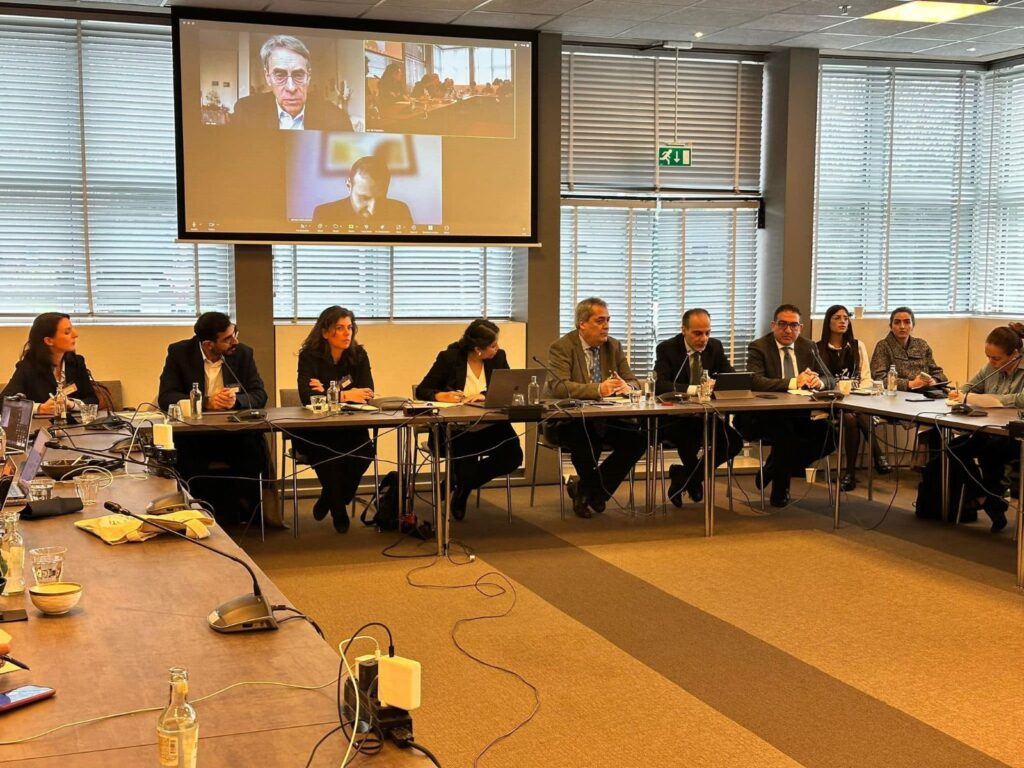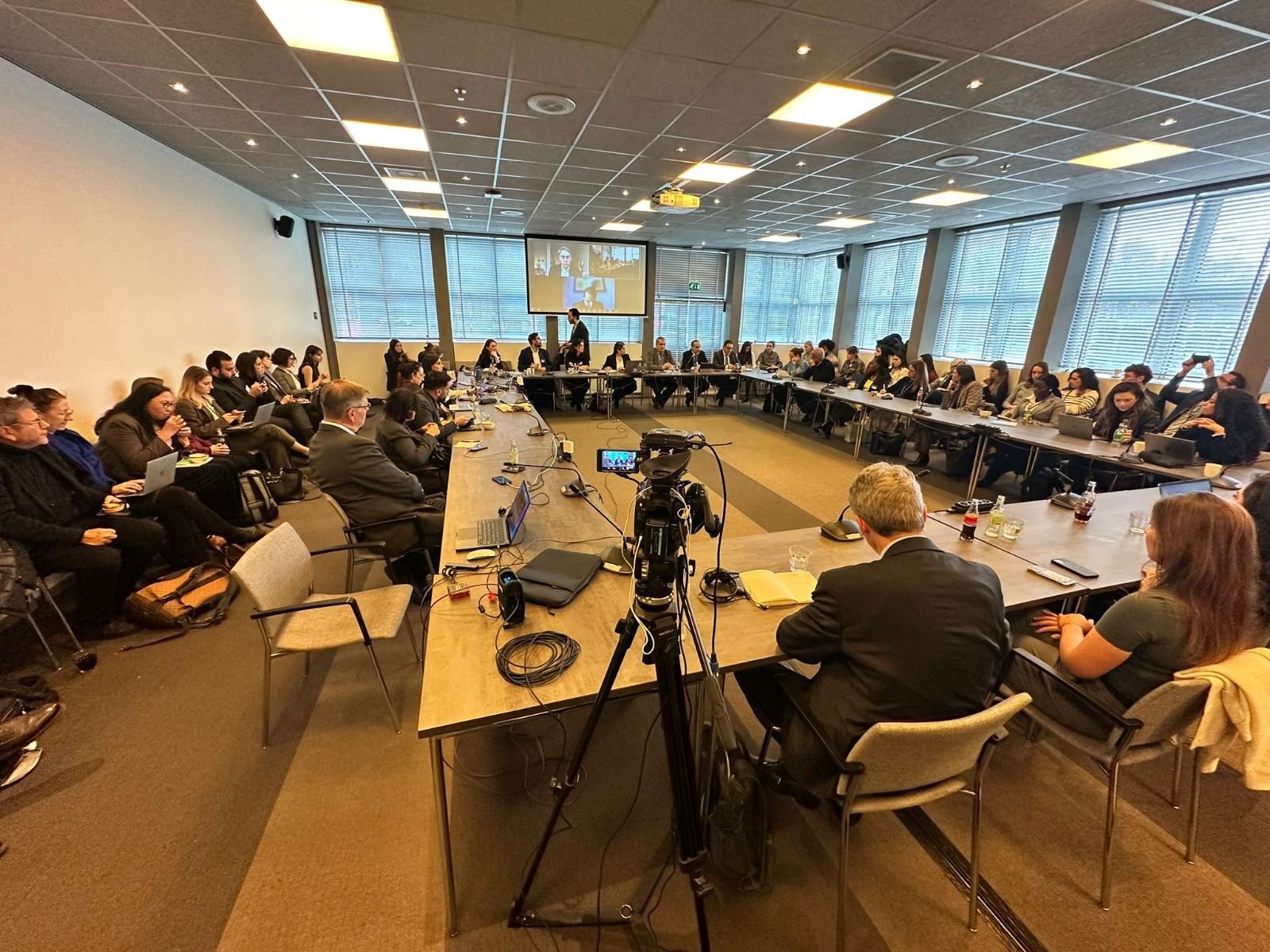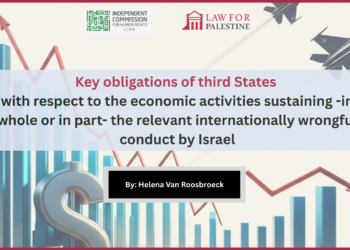From Impunity to Accountability: Law for Palestine Co-Hosts a Side Event at the ICC Addressing State’s Role in Supporting the Court’s Response to the Situation in Palestine
Law for Palestine, in collaboration with the Independent Commission for Human Rights – Palestine (ICHR), the State of Palestine, and the Republic of Colombia, hosted a side event during the International Criminal Court’s (ICC) 23rd Session of the Assembly of States Parties (ASP). The event, titled “From Impunity to Accountability: The Role of ASP Member States in Supporting the ICC’s Response to the Situation in Palestine,” aimed to amplify victims’ urgent appeals for justice, examine challenges faced by the ICC, and discuss steps ASP Member States must take to ensure accountability and strengthen the ICC’s capacity to address violations of international law.
The event brought together a distinguished gathering of diplomats, researchers, and human rights defenders. It was moderated by Anisha Patel, a Governing Council Member at Law for Palestine and a PhD researcher. The opening remarks were delivered by Ambassador Ammar Hijazi (Palestinian Representative to the Kingdom of the Netherlands and Ambassador of Palestine to International Organisations in The Hague), Ambassador Juan José Quintana (Deputy Permanent Representative of the Colombian Mission in New York); and Ammar Dwaik (Director General of the ICHR). The panel featured five distinguished speakers: Ahmed Mokhallalati (Palestinian Surgeon, Head of the Burns and Plastic Surgery Department at Al-Shifa Hospital in Gaza), Chantal Meloni (Legal Representative of Victims of Gaza at the ICC), Kenneth Roth (Visiting Professor at Princeton School of Public and International Affairs and Former Executive Director of Human Rights Watch), Hassan Ben Imran (Governing Council Member at Law for Palestine and PhD researcher), and Giulia Pinzauti (Expert in International Criminal Law and International Tribunals).
Opening Remarks by Ammar Dwaik
Ammar Dwaik emphasized the urgency of collective action to alleviate the suffering of Palestinian victims. He described the ICC’s issuance of arrest warrants as a critical yet fragile step toward justice and urged the ICC Prosecutor to broaden investigations to include long-standing war crimes and crimes against humanity in Palestine. Dwaik called for the inclusion of events predating October 2023, reaching back to 2014, to ensure comprehensive accountability.
Dwaik detailed atrocities documented by the ICHR, including torture, forced displacement, and civilian targeting, supported by over 1,000 testimonies collected under dangerous conditions -testimonies that cost some ICHR staff their safety. Stressing the ICC’s role as a beacon of hope, he called for mobilizing political and diplomatic support to safeguard its credibility and enforce its rulings. Concluding, Dwaik affirmed that history will judge actions, not words, in the pursuit of justice.
History will judge not by words but by actions taken in the pursuit of justice
Remarks by Ambassador Ammar Hijazi
Ambassador Ammar Hijazi framed the moment as a pivotal test for international justice, highlighting the choice between upholding the rule of law or succumbing to a hegemonic and discriminatory global order. He criticized double standards in international accountability, referencing a U.S. senator’s admission that the ICC was never intended to apply to Western powers.
Hijazi positioned Palestine’s case as a moral and legal challenge for the international community, warning that failure to act would embolden impunity for war crimes and crimes against humanity. He called for unwavering support of the ICC’s independence and integrity, rejecting exceptions to accountability. Concluding, Hijazi reaffirmed Palestine’s commitment to justice as both a moral duty and historical responsibility.
Remarks by Ambassador Juan José Quintana
Ambassador Juan José Quintana condemned the ongoing genocide and war crimes in Gaza, expressing frustration over global inaction and the UN Security Council’s paralysis. He criticized the obstruction of resolutions addressing the crisis through debates over semantics, undermining their significance.
Quintana commended South Africa’s interpretation of the Genocide Convention, which frames the duty to prevent genocide as an actionable obligation for all state parties. He urged states to take decisive action to uphold international justice and prevent further atrocities.
Testimony by Dr. Ahmed Mokhallalati
As a plastic and reconstructive surgeon, Dr. Ahmed Mokhallalati recounted the catastrophic impact of the recent genocide on Gaza’s healthcare system. Having relocated to Gaza in early 2023, Mokhallalati described unprecedented burn injuries caused by unconventional high-temperature weapons. Within three weeks, Al-Shifa Hospital admitted over 90 burn patients, many with injuries covering more than 30% of their bodies, and faced a severe resource shortage leading to an 80% mortality rate among burn victims.
He highlighted the dire conditions during the Israeli occupation of Al-Shifa Hospital, where critical facilities were destroyed, and patients and staff forcibly evacuated, resulting in preventable deaths. Mokhallalati called for international accountability for systematic targeting of medical infrastructure and personnel.
Remarks by Chantal Meloni
Chantal Meloni, Legal Representative of Victims of Gaza at the ICC, outlined the prolonged legal struggle to address violations in Palestine. She highlighted milestones such as Palestine’s 2009 bid for ICC jurisdiction, the 2015 ratification of the Rome Statute, and the ICC’s subsequent investigations.
Meloni emphasized expanding charges to include crimes against humanity, such as persecution and apartheid, alongside war crimes. She argued for accountability extending to a broader range of perpetrators and stressed the need for a rights-based discourse to ensure justice for future generations.
Remarks by Kenneth Roth
Kenneth Roth addressed attempts to create an “Israel exception” to the ICC’s Rome Statute, focusing on challenges to arrest warrants, threats to their execution, and retaliatory measures against ICC officials. Roth criticized countries like Germany and Israel for undermining Palestine’s statehood and claims of complementarity to obstruct ICC actions.
He condemned sanctions and threats against ICC officials, urging states to resist political interference, enforce legal provisions against obstruction, and hold perpetrators of war crimes accountable. Drawing on historical cases such as Charles Taylor’s prosecution, Roth underscored the importance of maintaining the ICC’s integrity.
Roth condemned sanctions and threats against ICC officials, urging states to resist political interference
Remarks by Hassan Ben Imran
Hassan Ben Imran focused on the international legal ramifications of the ongoing genocide in Gaza. Citing Israeli officials’ statements and actions, he argued that the conduct meets legal criteria for genocide under international law, referencing precedents such as the Al-Bashir case.
Ben Imran urged the ICC to include genocide charges in arrest warrants and called for decisive international action to confront genocidal practices. He criticized the global community’s inaction and emphasized the urgent need to uphold human rights and international law principles.
Remarks by Prof. Giulia Pinzauti
Prof. Giulia Pinzauti emphasized the obligation of states to comply fully with judicial decisions, particularly regarding the execution of ICC arrest warrants. She stressed that adherence must be unconditional and free from political considerations.
Pinzauti highlighted the role of states in shaping international law, noting their influence on legal norms. She concluded by urging state parties to the Rome Statute to uphold their obligations, warning that non-compliance undermines the international justice system’s integrity and credibility.






